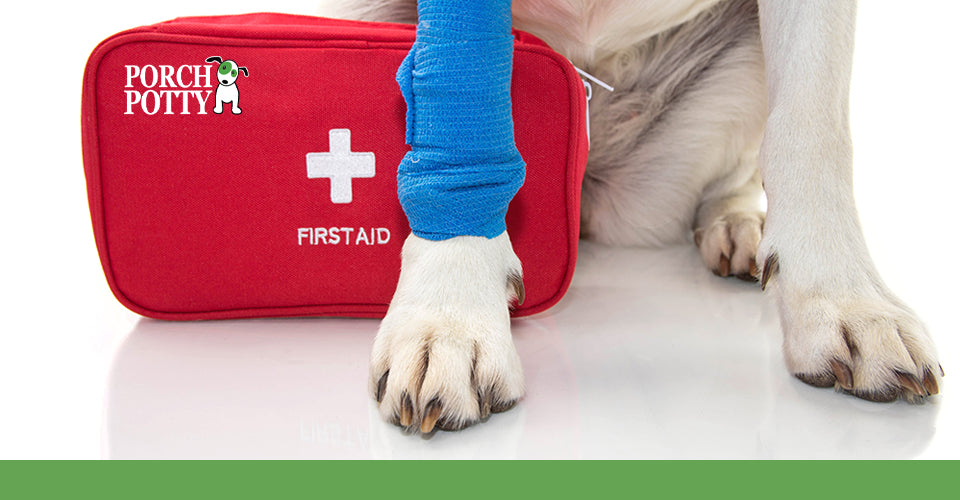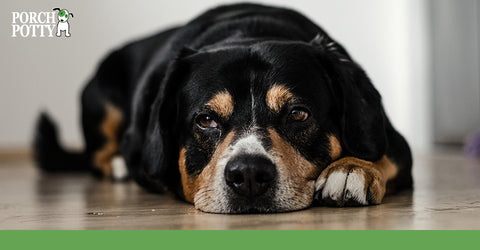
Trying to determine if your dog needs to see the veterinarian can be tricky, especially because they can’t talk! To be 100% sure, it is always best to reach out to your veterinary team to let them know what is going on, so they can advise you best. But in the meantime, here are some tips to know when it is time to bring your furry family member to the vet!
Emergency Situations
Emergency situations can be stressful and overwhelming. It’s always a good idea to have the number of a 24-hour emergency veterinarian on your fridge or on your phone should any emergency arise.
Here are some conditions that would require emergency care immediately:
- Seizures
- Open wounds
- Broken bones
- Sudden lethargy/listlessness
- Traumatic incident (hit by a car, attacked by another animal)
- Pale gums
- Swollen, red or irritated eyes
- Difficulty breathing
- Bleeding from the nose
- Allergic reaction (i.e. facial swelling from a bee sting or a vaccine reaction)
- Sudden collapse
- Persistent coughing
- Large breed dog that has a distended abdomen and is regurgitating/ trying to vomit
- Toxin ingestion
- Foreign body ingestion (i.e. eating a toy, sock, etc)
- Vomiting blood
- Bloody diarrhea
- Dark, tarry stool
- Vomiting or diarrhea of high frequency
- Inability to produce urine
- Incoordination
If you are concerned that your dog may be suffering from an emergency listed above please seek help from your nearest veterinary emergency hospital.
 Trust your instincts. If something seems off with your dog, you're probably right.
Trust your instincts. If something seems off with your dog, you're probably right.
If you are unsure if your dog’s situation is deemed an emergency- call your veterinarian! They will be happy to guide you as to whether or not your perceived emergency requires care.
Keep your local 24 hour veterinarian hospital number posted in an obvious spot, like on your refrigerator.
Besides emergencies, there are many other medical reasons that your dog may experience that should be cared for by a veterinarian.
Skin Changes
Any changes to your dog’s appearance can be an indication that they need to see their vet. These changes can include but are not limited to:
- Fur loss
- Itching
- Redness
- Open wounds
- Bleeding
- Suddenly developing a lump or a vast change in an existing lump
- External parasites (such as fleas or ticks)
Eyes
In general, eyes tend to be very delicate and because of this, their state can alter quickly. Here are some things to look out for that indicate that you need to seek veterinary advice:
- Discharge (yellow, white, green, red)
- Swelling
- Squinting
- Redness

Keeping a watchful eye on our furry friends' health is key to their happiness and well-being
Gastrointestinal
The gastrointestinal system can be tricky to interpret because some pets may experience intermittent vomiting or diarrhea, especially those with sensitive stomachs or a tendency to eat human food. When vomiting or diarrhea occurs it is very important to consider how your pet is doing overall:
- Are they still eating and drinking?
- Are they still their regular bouncy selves?
- Are they listless, lethargic, and not wanting to eat?
You know your pet best, so if you sense that they are slightly off- then you are probably right and should call your veterinarian.
Moreover, their stool can be a good indicator of overall health and if their stool consistency suddenly changes, that should tell you that something may be off with your dog and that you should call your vet.
Here are some general gastrointestinal situations that would require a visit to the vet:
- Vomiting blood
- Persistent vomiting (vomiting numerous times)
- Persistent diarrhea
- Bloody diarrhea
- Sudden change in stool consistency (mucus, tarry, hard, loose)
Body Condition
The way your dog looks is actually very important! If you notice that your dog’s weight has suddenly changed, call your vet. Weight gain despite eating their regular diet with a regular appetite can indicate an underlying endocrine disease. Weight gain and increased appetite may also indicate an underlying disease.
Any unexplained fluctuations in weight and appetite warrants a visit to your veterinarian
Similarly, weight loss, in the face of an increased appetite or weight loss with a decreased appetite can indicate underlying disease as well. So if you notice a sudden change in your dog’s weight call your veterinarian for further advice.
Appetite and Thirst
Eating and drinking are simple but very important ways to keep an eye on your dog. If you notice that they suddenly seem super hungry, something is probably up! If they are suddenly disinterested in food, then they probably aren’t feeling very well. Similarly, if they seem to be drinking more or less water this may also indicate that something is going on. So it is best to reach out to your veterinary team to let them know of the change and get your pet examined as well as bloodwork run.

Lack of responsiveness and excessive sleepiness may indicate your pup isn't feeling well.
Attitude
As pet parents, you know your dog best! Your pet’s behavior can be indicative of how they are feeling. If you notice that they are more tired than usual this may mean that they aren’t feeling well. If they have suddenly become grumpy and aggressive, this can indicate that they are suffering from pain and/or underlying disease. Similarly, if they seem anxious, such as panting, pacing, and the inability to settle, this too may mean that your pet is experiencing an underlying disease. Should you notice a sudden change in your dog’s demeanor, book an appointment with your veterinarian.
You know your dog best! If his or her personality seems off to you, if they seem more sensitive, quiet or cranky than normal, trust your instincts and make an appointment.
Mobility
If your pet is having difficulty walking, running, or rising it is best to get them checked by your vet. It is a common misconception that some degree of limping is acceptable but in reality, it is not.
Limping is a direct indicator of pain, which means that your dog needs to see a vet so that they can get a diagnosis as well as pain relief.
It is common for dogs to get soft tissue injuries (such as pulling a muscle), but if your pet limps, or has difficulty with their mobility, for more than 24hrs, then take them to their vet for a physical exam, potentially x-rays as well as pain relief. That being said, it is possible that your dog may have suffered a traumatic injury such as a fracture and in that case, they should not wait to be seen by a vet.
It is important to note that you should NEVER medicate your pet at home with ANY human medication or your other pet’s medication- always call your vet first to ensure that it is in your pet’s best interest.
If your pet is experiencing a situation that is not listed above and you are still unsure if you should seek care from a veterinary professional then please call your veterinary team. Your vet team is there to help your pet and will be happy to discuss your pet’s situation over the phone and guide you as to what your next steps are to keep your furry family member safe and healthy!
For more information on doggy health, check out these articles:




